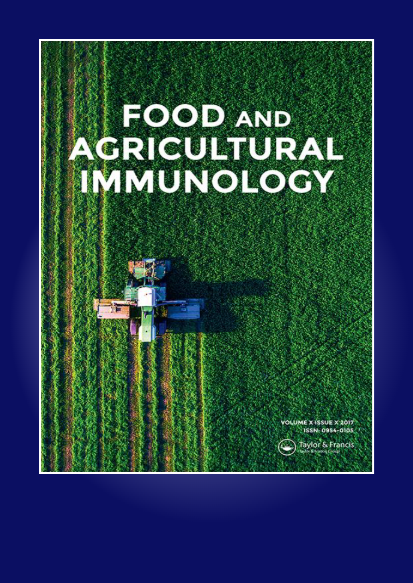Deep-sea-derived viridicatol relieves allergic response by suppressing MAPK and JAK-STAT signalling pathways of RBL-2H3 cells
IF 2.1
3区 农林科学
Q3 CHEMISTRY, APPLIED
引用次数: 0
Abstract
ABSTRACT Our previous studies reported that viridicatol isolated from the deep-sea-derived fungus Penicillium griseofulvum could regulate the stabilisation of mast cells to relieve food allergy. To understand the molecular role of viridicatol in stabilising mast cells, transcriptomes of viridicatol-treated RBL-2H3 cells were analysed by RNA-sequencing. There were 128 differentially expressed genes in activated RBL-2H3 cells with or without viridicatol treatment. The mast cell activation-related genes were significantly reduced by treatment with viridicatol through RT-qPCR analysis. Moreover, Kyoto Encyclopedia of Genes and Genomes enrichment analysis indicated that viridicatol was important in mast cell stabilisation by affecting MAPK and JAK-STAT signalling pathways. Additionally, molecular docking and western blot analysis revealed that the phosphorylated JNK, ERK, P38, and STAT6 proteins were inhibited by viridicatol. Taken together, viridicatol has the potential to be used as a new type of anti-food allergic functional material via controlling MAPK and JAK-STAT signalling pathways of mast cells.深海源性vi讥讽醇通过抑制RBL-2H3细胞的MAPK和JAK-STAT信号通路减轻过敏反应
本文章由计算机程序翻译,如有差异,请以英文原文为准。
求助全文
约1分钟内获得全文
求助全文
来源期刊

Food and Agricultural Immunology
农林科学-毒理学
CiteScore
5.30
自引率
6.70%
发文量
52
审稿时长
2 months
期刊介绍:
Food and Agricultural Immunology is an international open access journal publishing original immunological research with applications in food, agricultural, environmental and veterinary science. Submissions describing the use of immunological techniques and methods are particularly welcomed.
The journal aims to expand our understanding of the interactions at the interface of food and immune systems including studies on:
-Development of diagnostic systems – all types of ligand-based assays, e.g. antibody, aptamer
-Application of ligand-based assays for the detection or identification of molecules of interest in food science, agricultural research, veterinary investigations and clinical systems relating to food allergy or sensitivity to agricultural chemicals
-Effects of food on the immune system
-Studies on allergy and allergic reactions
-Investigations into food allergies
-Development of allergen-free food systems
-Development of novel assay formats
-Applications of assay systems to the monitoring of food items in relation to safety and labelling
-Food quality issues, e.g. speciation, adulteration and contamination
-Comparisons between different analytical techniques
The journal publishes research and review articles and is essential reading for food scientists, immunologists and all those concerned with the interaction between food and immune systems.
 求助内容:
求助内容: 应助结果提醒方式:
应助结果提醒方式:


